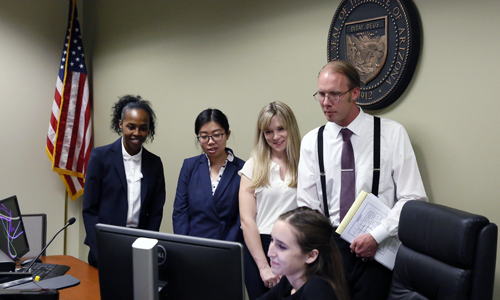ASU Law wins coveted 9th Circuit Award for second time

Les Schiefelbein and Art Hinshaw at the 2019 Schiefelbein Global Dispute Resolution Conference at ASU Law.
The Sandra Day O'Connor College of Law at Arizona State University was recently awarded the Ninth Circuit Alternative Dispute Resolution (ADR) Education Award for 2019, presented by the Ninth U.S. Circuit Court of Appeals.
The judicial council of the Ninth Circuit established the Ninth Circuit ADR Education Award to recognize law schools that have significantly advanced education, scholarship and research in the field of alternative dispute resolution, popularly known as ADR.
This award marks the second time ASU Law has been recognized as a leader in ADR education. ASU Law also won this award in 2005, the first year in which it was given.
“I am extremely proud of our innovative work in alternative dispute resolution, and I am honored that our efforts have been recognized for a second time,” ASU Law Dean Douglas Sylvester said. “Our faculty and their dedication to the success of our students and clinical programs not only prove that they are committed to improving access to ADR curricula and education but to the field in general.”
All American Bar Association-accredited law schools within the Ninth Circuit were eligible to apply for this recognition. The Ninth Circuit Court of Appeals comprises Alaska, Arizona, California, Hawaii, Idaho, Montana, Nevada, Oregon, Washington, the U.S. Territory of Guam and the Commonwealth of the Northern Mariana Islands.
ASU Law emerged as a leader in alternative dispute resolution education by successfully bridging theory and practice. This is possible in large part due to the impact of ASU Law’s Lodestar Dispute Resolution Center, led by Faculty Director and Clinical Professor Art Hinshaw. ASU Law's ADR program is ranked No. 10 in the country by U.S. News & World Report.
“This award recognizes the faculty’s dedication to advancing ADR as a critical element of our legal system. I can’t thank the faculty and ASU Law’s administration enough for its determination and hard work to get this center off the ground the past three years,” said Hinshaw.
The Lodestar Dispute Resolution Center expands ASU Law’s efforts to understand the nature of conflict and how best to resolve disputes outside a courtroom. Students, lawyers and nonlegal professionals learn the problem-solving methods and skills that lawyers and other conflict resolution professionals employ regularly to prevent and resolve disputes.
The Lodestar Center’s work is, in some respects, typical of dispute resolution programs across the country: offering a variety of courses, publishing scholarly works, presenting expert speakers, providing student opportunities outside the classroom and delivering a range of continuing educational programs. ASU Law’s Lodestar Center has distinguished itself from peer institutions — making it truly innovative — through its emphasis directed at the broader public to help resolve conflict before it becomes formalized in the courts.
“What sets ASU Law apart is our recognition that conflict permeates society and that our work shouldn’t be confined within the parameters of the legal world,” said Hinshaw. “We work with groups — both large and small — to teach nonlawyer professionals conflict resolution skills to enhance their job performance,” Hinshaw said.

ASU Law students gain real-world experience with the Lodestar Mediation Clinic mediating cases at the Maricopa County Justice Courts.
ASU Law’s robust dispute resolution curriculum provides law students with both a framework to understand and to manage conflict using a variety of processes and real-world opportunities to practice dispute resolution techniques. The curriculum includes the following doctrinal and skills courses: arbitration, contract drafting and negotiation, dispute resolution in employment, dispute resolution survey, international dispute resolution, negotiation, mediation advocacy, and the Lodestar Mediation Clinic, where students can act as mediators in civil cases in the Maricopa County Justice Courts.
Besides the center’s curriculum, students have access to unique externships and are also encouraged to take advantage of additional programs and opportunities, such as moot court competition teams and the Dispute Resolution Student Association.
Since receiving the judicial council’s inaugural award in 2005, ASU Law has evolved significantly in the ADR space.
“This award recognizes our growth over time — becoming a center, beginning two high-profile public events — the Bruce E. Meyerson Lecture and the Schiefelbein Global Dispute Resolution Conference — creating a conflict resolution Master of Legal Studies degree, and working with groups like Amnesty International. Our program simply is much more robust since the last time we won the award,” said Hinshaw.
More Law, journalism and politics

How ASU is leading the national conversation on journalism and AI
As artificial intelligence continues to advance at a rapid pace, journalism faces both unprecedented opportunity and profound…

5 takeaways about artificial intelligence and elections
Next year’s midterm elections are happening at a crucial time in the adoption of AI, with concerns that the new technology could…

ASU dominates Rocky Mountain Emmys, showcasing range of talent
Arizona State University stole the spotlight at the Rocky Mountain Southwest Emmys, walking away with an impressive haul of shiny…